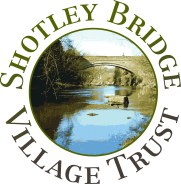Shotley Spa
The spa at Shotley Bridge was developed by Mr. Jonathan Richardson [Senior], a local landowner and businessman who was involved in philanthropic as well as commercial enterprises, being a prominent member of the Quaker brotherhood. Development started there in 1837 and the spa opened in 1838. Charles Dickens visited in 1839, when he was 27 years old, saying the water tasted like ‘poison’.
Shotley Spa offered a spa well, refreshment rooms, a bath house, saloon and reading rooms; the veritable Harrogate of the area. Carriage drives and footpaths were laid down and the ‘Spa Grounds’ landscaped to give the appearance of an ornamental garden. The main access from the lodge gates at the entrance was a mile long carriage road.

Until the new toll road [known as the ‘Low Road’] from Newcastle was opened in 1843, Shotley Bridge was relatively remote, but even then access was limited to stage coach and other horse drawn vehicles. When the railway from Blaydon to Consett was opened to passenger traffic in 1867 Shotley Spa became very popular and the new station at Elm Park brought thousands of visitors. The Spa was popular as a watering place for well over 60 years, although the flow of visitors diminished at the turn of the century.
The Spa Grounds continued to provide the venue for many of the social events in Shotley Bridge – fairs, flower shows, fancy dress parades, many reported in the Newcastle Courant of 1857 and 1858. The Shotley Bridge Horticultural Society hosted their annual exhibition there from 1849. It was said to be one of the biggest and best of its kind in the whole Country, with attendance often over 50,000 throughout the day, many of whom travelled on special trains from all over the North East.
In 1888 Shotley Bridge Cricket Club was set up there, followed by a tennis club in 1927. The Shotley Bridge and Benfieldside Tennis Clubs merged in 1975 and are now only based at Benfield Close.
Today only the stone base of the Spa Well can be seen, though overgrown. The cottages having been converted into private dwellings.

